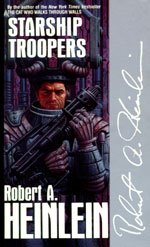
This book was done a great injustice by a movie adaptation made in 1997. The book is an acknowledged sci-fi classic. The movie is an acknowledged piece of forgettable summer fluff. It's one of the most disappointing treatments of classic sci-fi ever to go to the big screen. And hey, I'm talking in comparison to "I, Robot" and "The League of Extraordinary Gentlemen". Those movies didn't set the bar real high, so the fact that it can't even compare to them is bad. Anyway, forget the movie for now. The movie and the book have little to nothing to do with each other.
Since it's not my purpose to tell you everything about the book but whether you should read it or not, if you want to know more about the facts of the book, check it out on Wikipedia. It's a very complete article and very much worth reading.
Starship troopers may be the first book ever written which can be called military science fiction. This is no reason to like it, but certainly a reason to read it. Heinlein had many interesting ideas in regards to the direction of the military in the future. He may not be dead on with where society as a whole is going, but he posited at least three trends that we do see today: the all-volunteer armed forces; the technological warrier in powered armor, and the highly trained engineer/warrior model for the soldier. He wrote this book in 1959, well before there were any possible indicators to suggest that these would be trends in the future. For example, when he was a soldier and when he wrote the book, the armed forces consisted of a professional officer corps and draftees. In 1959, personal body armor was unknown. Americans went to Vietnam with essentially the same gear as their fathers had in WWII and Korea (and sometimes the same rations!). You can definitely consider this book prophetic on that score.
Another reason to read the book is that in it, Heinlein lays forth his political philosophies. One of those is that violence can and does solve plenty of our problems. He also says things like nuclear weapons are good and that our current form of democracy, a government by the people, is ridiculous. That may be oversimplifying it, but the point is that he has some viewpoints which would be seen as ultra-conservative these days and completely reactionary. Not that you should discount them simply becuase they were written so long ago. As a matter of fact, it's a good challenge to come up with reasons why our country should not be run solely by soldiers.
The book is short, which saves it somewhat from getting too tedious when the characters are so underdeveloped. However, Rico's accounts of his development as a soldier, from the last days of high-school to his current status as a Lieutenant in command of his own platoon do make for interesting reading. This book is an extremely realistic account of what it takes to make soldiers. Without the sci-fi aura, it could simply be read as a soldier's story. Rico does have a story worth reading.
Anyway, I'll admit it's not a great book and certainly not the best reading you could have, but it's not too long to take the time out to read it. It'll be worth it.
2 comments:
I enjoyed Starship Troopers, the book and the movie. I think the movie attempts to make itself into sort of a parody of what Heinlein sort of presented in the book, but did so only in an effort to make itself seem smarter a movie than it was. The book is much more intriguing, realistic, and gritty. I don't agree with much of Heinlein's politics, and I think one can question his basic premise that only those who served should have a right to have a say in society, but if his point was get discussion going he certainly achieves that. But overall I think it's just good sci-fi too.
Yeah, when I was reading about the book, I think people completely forgot to mention that it was an enjoyable read. A lot of people forget that that's worth something. I think that even if the author is a Nazi, if he writes a good book, you have to give it the credit it's due. Heinlein wasn't a nazi, but you could accuse him of fascism. The difference between him and Upton Sinclair is that his political viewpoint doesn't get in the way of the writing.
Post a Comment